
German postcard by FM, no 5153. Photo: Studium Film. Vladimir Gajdarov as Paris in Helena (Manfred Noa, 1924).

German postcard by Ross Verlag, no. 887/1, 1925-1926. Caption: Vladimir Gajdarov (Waldimir Gaidarow) in a double role.
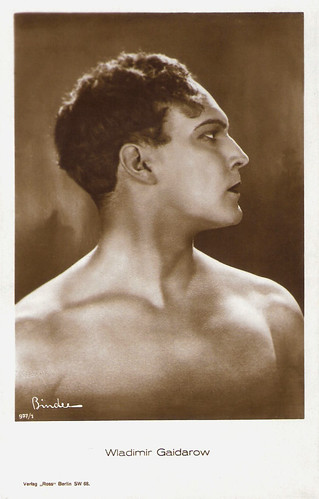
German postcard by Ross Verlag, no. 977/1, 1925-1926. Photo: Alex Binder, Berlin.

Italian postcard by G.B. Falci, Milano, no. 129. Photo: A. Stefano Pittaluga. Lya de Putti and Vladimir Gajdarov in Manon Lescaut (Arthur Robison, 1926).
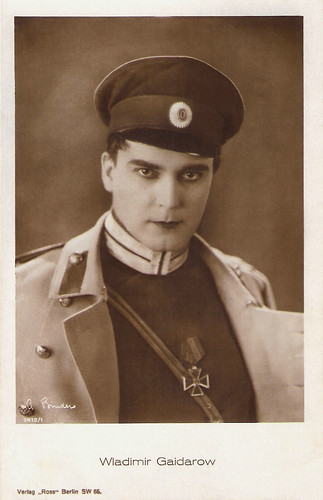
German postcard by Ross Verlag, no. 1412/1, 1927-1928. Photo: Alex Binder, Berlin.
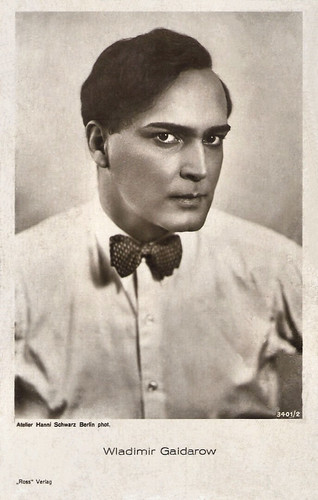
German postcard by Ross Verlag, no. 3401/2, 1928-1929. Photo: Atelier Hanni Schwarz, Berlin.
Stanislavski
Vladimir Georgiyevich Gajdarov was born in Poltava, Russian Empire (now Ukraine), in 1893. He supposedly was the son of a noble family.
He studied history, philosophy and the German language before he became a pupil of the famous stage director Konstantin Stanislavski. Soon he became a very popular actor on the Russian stage.
He began his film career in Russia before the October Revolution. His first appearance was opposite his wife-to-be, the famous Stanislavski actress Olga Gzovskaya, in Yeyo zhertva/Her Sacrifice (Cheslav Sabinsky, 1917) based on a play by Henrik Ibsen.
Next, he played with Ivan Mozzhukhin in Ne nado krovi/Blood Need Not Be Spilled (Yakov Protazanov, Alexandre Volkoff, 1917). The two actors were also featured in Otyets Sergei/Father Sergei (Yakov Protazanov, Alexandre Volkoff, 1917-1918), based on a Leo Tolstoy story. This popular film tells the tale of an officer who becomes a monk after hearing of his fiancée's affair with the Tsar.
Another film was Iola (1920) by animation filmmaker Wladyslaw Starewicz. In 1920 Gajdarov and Olga Gzovskaya left Russia. They eventually arrived in Turkey, and in Constantinople, he directed two films to raise money to aid the many stranded Russian refugees who had fled the Bolsheviks.
Latvian (?) postcard by KLTD.

German postcard by Ross Verlag, Berlin, no. 653/5. Photo: May-Film. Mia May and Vladimir Gajdarov in Tragödie der Liebe/Tragedy of Love (Joe May, 1923).
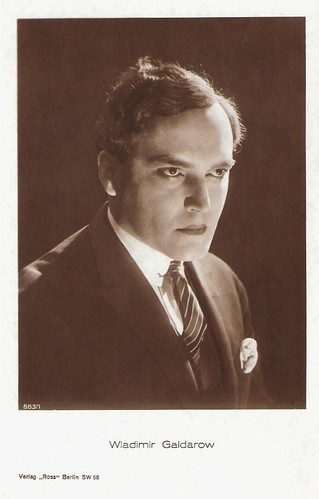
German postcard by Ross Verlag, Berlin, no. 883/1, 1925-1926.
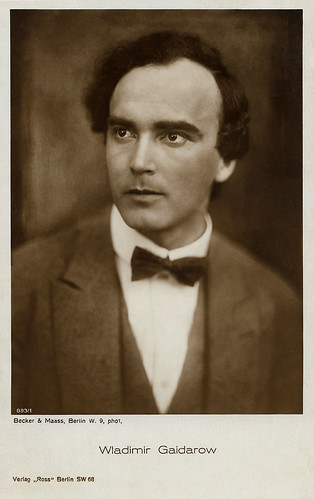
German postcard by Ross Verlag, Berlin, no. 893/1, 1925-26. Photo: Becker & Maass, Berlin.
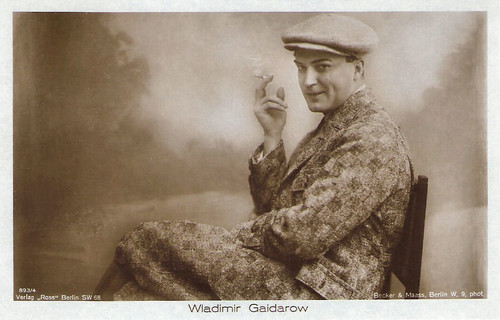
German postcard by Ross Verlag, Berlin, no. 893/4, 1925-1926. Photo: Becker & Maass, Berlin.

German postcard by Ross Verlag, Berlin, no. 937/1, 1925-1926. Vladimir Gajdarov in the stage play 'Schuld und Sühne' (Crime and Punishment), based on Dostojevski's classic novel.
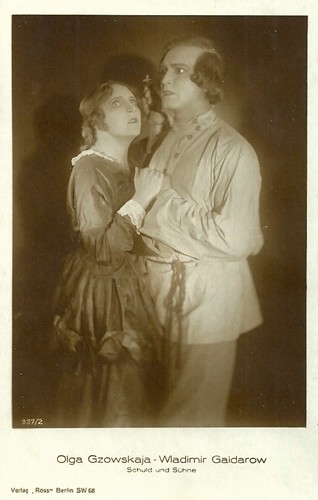
German postcard by Ross Verlag, no. 937/2, 1925-1926. Vladimir Gajdarov and Olga Gzovskaya in Schuld und Sühne, an adaptation of Dostoevski's Crime and Punishment (Raskolnikov). Unclear which film this is, as a 1922/1923 German version, called Raskolnikow (directed by Robert Wiene), starred Grigori Chmara and not Gajdarov.
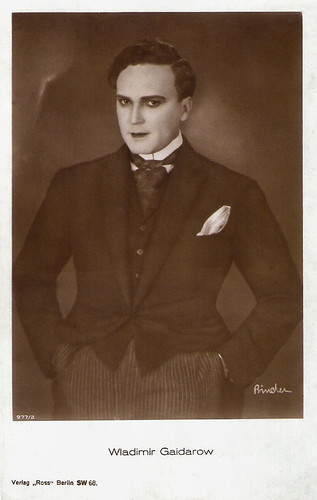
German postcard by Ross Verlag, no. 977/2, 1925-1926. Photo: Alex Binder, Berlin.
Haunted, pale face
In the following years, Vladimir Gajdarov worked in various European countries. Especially in Germany, he found rewarding roles in films.
With his haunted, pale face he acted in Der brennende Acker/The Burning Earth (F.W. Murnau, 1922) opposite Lya de Putti, and in Die Gezeichneten/Love One Another (Carl Theodor Dreyer, 1922).
Gajdarob played a double role in the Alexandre Dumas père adaptation Der Mann mit der eisernen Maske/The Man in the Iron Mask (Max Glass, 1923) starring Albert Bassermann. Other popular German films were the serial Tragödie der Liebe/The Tragedy of Love (Joe May, 1923) with Marlene Dietrich, and Manon Lescaut (Arthur Robison, 1926), again opposite Lya de Putti.
In France, he appeared as Vladimir Gaidaroff in Le roman d'un jeune homme pauvre/The Novel of a Poor Young Man (Gaston Ravel, 1926) with Maly Delschaft, and in La Madone des sleepings/Madonna of the Sleeping Cars (Marco de Gastyne, Maurice Gleize, 1927).
He starred as an exotic lady-killer in Die Weisse Sklavin/The White Slave (Augusto Genina, 1927) opposite Liane Haid, and in Frauenraub in Marokko (Gennaro Righelli, 1928) with Dolly Davis.

French postcard by Europe no. 291. Photo: Cinéromans Films de France.
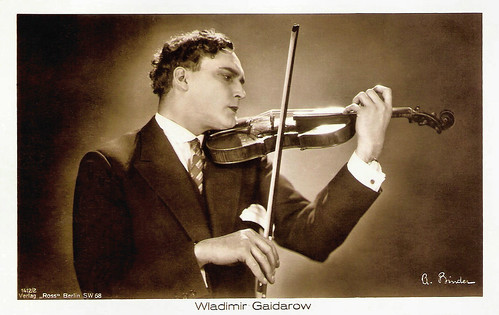
German postcard by Ross Verlag, Berlin, no. 1412/2, 1927-1928. Photo: Alex Binder.
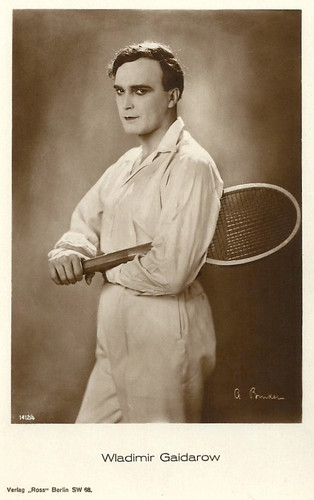
German postcard by Ross Verlag, Berlin, no. 1412/4, 1927-1928. Photo: Alex Binder.
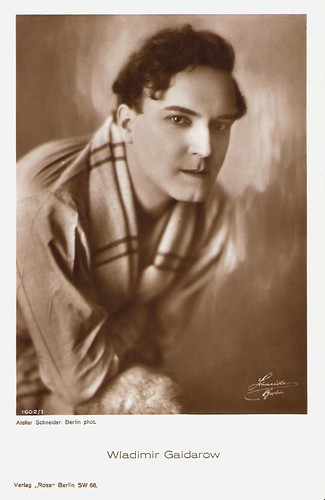
German postcard. Ross Verlag, no. 1602/1, 1927-1928. Photo: Atelier Schneider, Berlin.
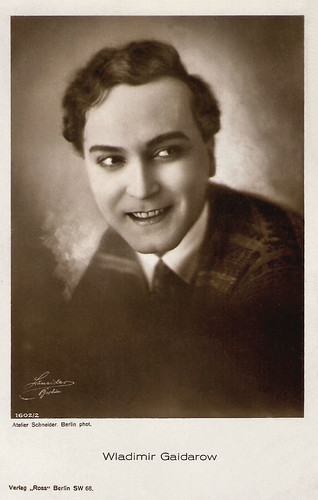
German postcard by Ross Verlag, no. 1602/2, 1927-1928. Photo: Atelier Schneider, Berlin.
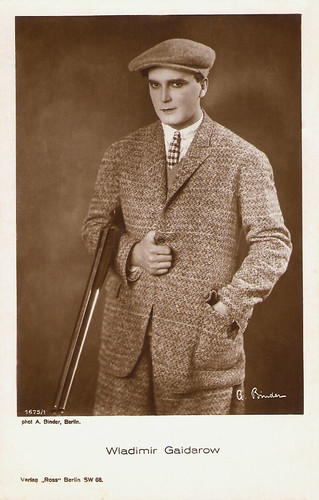
German postcard by Ross Verlag, no. 1673/1, 1927-1928. Photo: Alex Binder, Berlin.
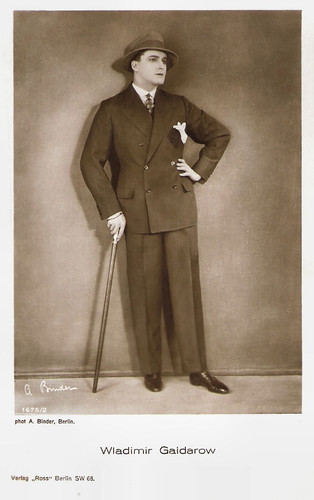
German postcard by Ross Verlag, no. 1675/2, 1927-1928. Photo: Alex Binder, Berlin.
Siberia
When the sound film arrived Vladimir Gajdarov's possibilities on the international film scene were seriously reduced. In 1930 he took on the position of film director and producer and made Kire lained/Wells of Passion (1930) with Ita Rina, but soon he had to return to acting again.
He appeared in a few German productions like Nachtkolonne/Night Convoy (James Bauer, 1931), and Luise, Königin von Preussen/Luise, Queen of Prussia (Carl Froelich, 1931), starring Henny Porten.
In 1932 he and Olga Gzovskaya returned to the Soviet Union. As former émigrés, they were unable to find employment until 1937.
During the Stalinist repression, with hundreds of people arrested every day, Gzovskaya wrote to Konstantin Stanislavski twice, begging for his help. Stanislavski responded with a letter, which helped them both to find professional work in theatres in Leningrad.
Later Gajdarov appeared in the propaganda film Stalingradskaya bitva/The Battle of Stalingrad (Vladimir Petrov, 1949-1950), Geroite na Shipka/Heroes of Shipka (Sergei Vasilyev, 1954), and the Norwegian-Russian coproduction Bare et liv/The History of Fridtjof Nansen (Sergei Mikalyen, 1968).
Vladimir Gajdarov published his memoirs in 1966. He died in Poltava, Siberia in 1976.
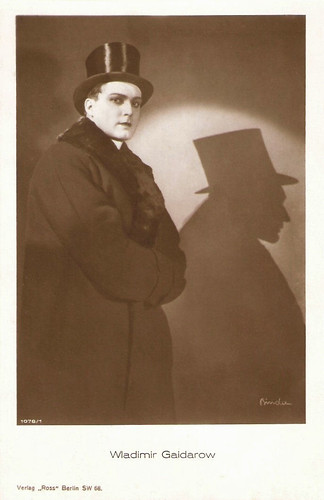
German postcard by Ross, Berlin, no. 1978/1, 1927-1928. Photo: Alex Binder.
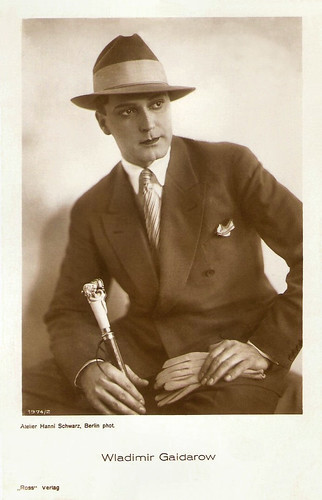
German postcard by Ross, Berlin, no. 1974/2, 1927-1928. Photo: Atelier Hanni Schwarz, Berlin.
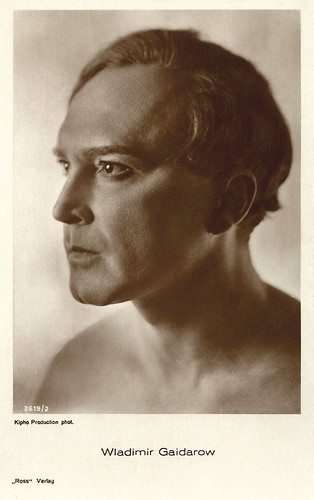
German postcard by Ross Verlag no. 3619/2, 1928-1929. Photo: Kipho Production.
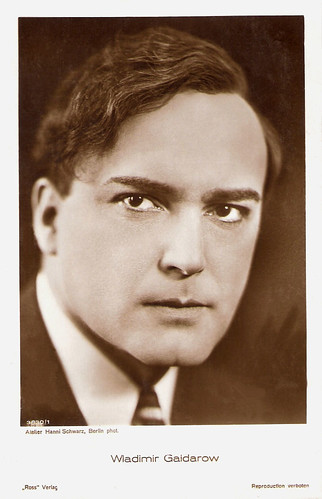
German postcard by Ross Verlag, no. 3830/1, 1928-1929. Photo: Atelier Hanni Schwarz, Berlin.

German postcard by Ross Verlag, Berlin, no. 3882/2, 1928-1929. Photo: Lichtenstein, Berlin. Vladimir Gajdarov in Frauenraub in Marokko/The Love of a Sheik (Gennaro Righelli, 1928).

German postcard by Ross Verlag, no. 3883/1, 1928-1929. Photo: Alex Binder, Berlin.
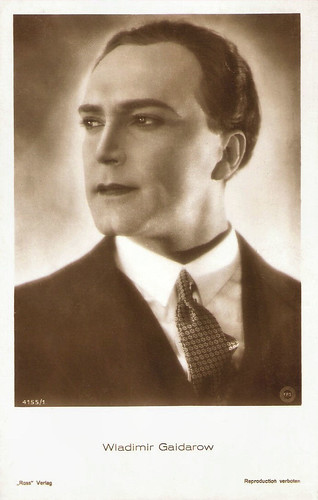
German postcard by Ross Verlag, Berlin, no. 4155/1, 1929-1930. Photo: FPS.
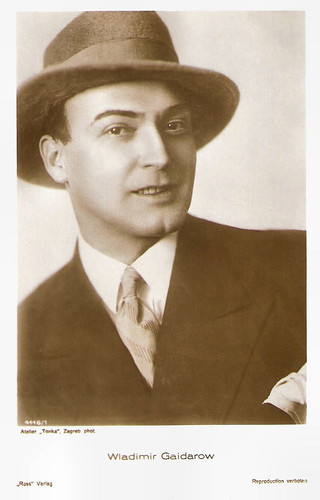
German postcard by Ross Verlag, Berlin, no. 4448/1, 1929-1930. Photo: Atelier Tonka, Zagreb.
Sources: Thomas Staedeli (Cyranos), Silents are Golden, The Silent Cinema Reader, Wikipedia and IMDb.
No comments:
Post a Comment